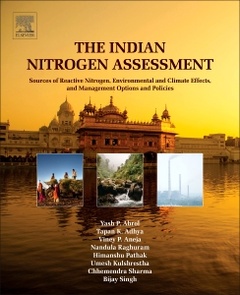Description
The Indian Nitrogen Assessment
Sources of Reactive Nitrogen, Environmental and Climate Effects, Management Options, and Policies
Coordinators: Abrol Yash P., Adhya Tapan K., Aneja Viney P., Raghuram N., Pathak Himanshu, Kulshrestha Umesh, Sharma Chhemendra, Singh Bijay
Language: EnglishSupport: Print on demand
Description
/li>Contents
/li>Readership
/li>Biography
/li>Comment
/li>
The Indian Nitrogen Assessment: Sources of Reactive Nitrogen, Environmental and Climate Effects, and Management Options and Policies provides a reference for anyone interested in Reactive N, from researchers and students, to environmental managers. Although the main processes that affect the N cycle are well known, this book is focused on the causes and effects of disruption in the N cycle, specifically in India.
The book helps readers gain a precise understanding of the scale of nitrogen use, misuse, and release through various agricultural, industrial, vehicular, and other activities, also including discussions on its contribution to the pollution of water and air. Drawing upon the collective work of the Indian Nitrogen Group, this reference book helps solve the challenges associated with providing reliable estimates of nitrogen transfers within different ecosystems, also presenting the next steps that should be taken in the development of balanced, cost-effective, and feasible strategies to reduce the amount of reactive nitrogen.
2. N fertilizer production and consumption: Indian scenario
3. Nitrogen processes in agricultural ecosystems
4. Nitrogen and crop production in India
5. Nitrogen Budget of Intensively cultivated Cropping systems in original Green revolution states of India
6. Efficient nitrogen management under predominant cropping systems in India
7. Nitrogen and crop quality
8. Plant nitrogen use efficiency
9. Nitrogen and soil quality
10. BNF contribution to reactive N: Indian scenario
11. Biological Nitrogen Fixation in India: Trend Line on Budget and scientific developments
12. Reactive N in Indian grasslands
13. Nitrogen in Agro-forestry of India
14. Reactive N in horticultural crops
15. Reactive N: Soil, animal and environment interface
16. Biological Nitrogen Fixation in India: Trend Line on Budget and scientific developments
17. Reactive N in Indian grasslands
18. Nitrogen in Agro-forestry of India
19. Reactive N in horticultural crops
20. Reactive N: Soil, animal and environment interface
21. Atmospheric Nr assessment in Indian region
22. Reactive N and water quality
23. Nitrates in Groundwater
24. N assessment in surface waters of India
25. N-oxides and cardiovascular disease
26. Nitrate toxicity in humans: an Indian scenario
27. Nitrogen in aquaculture and fisheries
28. Nitrogen and poultry production
29. Food choice and reactive N content in Indian region
30. Nitrogen and climate change
31. Nitrogen oxides and air quality
32. Reactive N dynamics in mangroves of India
33. Nitrogen processes in Indian coastal ecosystem
34. Nitrogen in coastal and oceanic systems
35. Nitrogen and natural ecosystems
36. Emission of reactive N from waste sector
37. N and Energy sector
38. Reactive N and policy issues
39. Nitrogen scenario of India – A futuristic assessment
Earth scientists, Environmental scientists, Agricultural scientists, Ecologists, Environmental chemists, Anthropologists, Engineers
Professor T.K. Adhya has research interest in the area of environmental microbiology and sustainable agriculture with emphasis on greenhouse gas emission, nitrogen nutrition and microbial diversity analysis, with flooded rice soil as the model ecosystem. Tapan has published more than 140 original research papers in leading national and international journals and authored more than 27 chapters in books published by established national and international publishing houses. He is also the author/coauthor of several international reports published by UNEP, Nairobi, SACEP, Colombo, WRI, USA, FAO, Rome and ISRIC, Netherlands.
- Identifies all significant sources of reactive nitrogen flows and their contribution to the nitrogen-cycle on a national, regional, and global level
- Covers nitrogen management across sectors, including the environment, food security, energy, and health
- Provides a single reference on reactive nitrogen in India to help in a number of activities, including the evaluation, analysis, synthesis, documentation, and communications on reactive nitrogen





